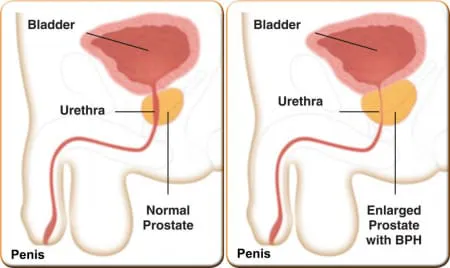Understanding Enlarged Prostate (BPH) In Milford, MA
What is BPH?

Benign Prostatic Hyperplasia (BPH), also known as Enlarged Prostate, is a common, benign (not cancerous) urological condition in older men in which the prostate gland becomes enlarged. The prostate is a walnut-sized gland that produces semen, the fluid that transports sperm. Because the upper portion of the urethra passes through the prostate, if the gland becomes enlarged, it can obstruct the passage of fluid through the urethra and result in difficulty urinating, a weak stream, or excessive daytime or nighttime urination. In the early stage of prostate enlargement, the bladder muscle becomes thicker and forces urine through the narrowed urethra by contracting more powerfully. As a result, the bladder muscle may become more sensitive, causing a need to urinate more often and more suddenly. In later stages, the bladder may become completely obstructed and the patient may not be able to urinate at all.
What causes BPH?
While the true underlying cause of BPH is unknown, BPH often occurs as a man gets older.
What are the symptoms of BPH?
The symptoms associated with BPH are known as lower urinary tract symptoms. (LUTS). While some men with an enlarged prostate/BPH experience mild symptoms, many others experience severe and life-changing symptoms. The more common symptoms that men with BPH may experience are:
- Difficulty starting or stopping during urination or significant dribbling after urination.
- Weak urinary stream.
- Incomplete emptying of the bladder.
- The urge to urinate again shortly after urination.
- Increasing, frequent urination, especially at night.
- Recurring, urgent need to urinate.
- Urinary Incontinence (Urine Leakage).
If you are experiencing any of these urinary symptoms, contact Dr. Steinberg at his Milford office at (508) 473-6333 to schedule an evaluation.
How is BPH diagnosed?
A complete medical history and physical exam, as well as a digital rectal exam, are the first steps in diagnosing BPH. In addition, a prostate specific antigen (PSA) blood test will be done. Diagnostic tests may also be done in the office to make the most accurate diagnosis and fully evaluate whether the urinary symptoms are caused by BPH and formulate the next steps to treating your urinary symptoms. These diagnostic tests may include:
- Uroflow: Measures the flow and force of your urine stream and is often performed in patients who experience problems with urination.
- Bladder Scan (post-void residual): A non-invasive ultrasound test that assesses the ability of the bladder to empty.
- UroCuff: Non-Invasive pressure flow test to determine whether the prostate or bladder or both are causing the urinary issues.
- Cystoscopy: A small telescope is used to look inside the bladder to assess your prostate and your bladder for signs of obstruction that may cause the urinary symptom.
- Transrectal ultrasound: Ultrasound to assess prostate size.
Learn how UroCuff can help diagnose BPH here .
Blog
Read more about the early symptoms of BPH here
What are the treatments for BPH?
Treatments for BPH may include medications or minimally invasive procedures to relieve the obstruction caused by the prostate. Dr. Steinberg provides the most advanced care for men living with BPH.
